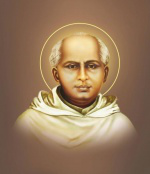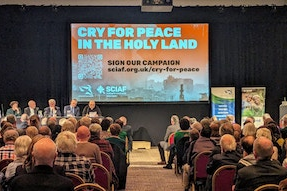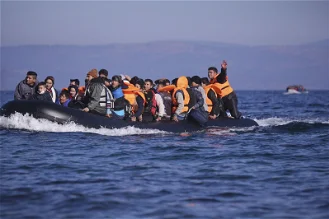Blessed Kuriakose Elias Chavara to be canonized

Bl Kuriakose Elias Chavara
On 23 November 2014, the feast of Christ the King, Blessed Kuriakose Elias Chavara, founder of the Order of Carmelites of Mary Immaculate (CMI) will be canonised in Rome together with five other beatified sons and daughters of the Church. The Carmelites of Mary Immaculate is the first indigenous religious congregation in the Indian Catholic Church, and is the largest religious order for men in the Syro-Malabar rite. The Syro-Malabar Catholic Church stems from the Syriac spiritual tradition and traces its origin to St Thomas the Apostle, who, according to tradition, came to the Malabar coast of southern India (the state of Kerala today).
Born in 1805 in Kainakary, Kerala, Blessed Kuriakose Elias Chavara began his education under a Hindu teacher who taught him languages, different dialects and basic sciences from the age of five and then, at the age of 10, he decided to study under a parish priest, having felt the call to become a priest himself.
Following his education he entered the seminary at Pallipuram and was ordained a priest on 29 November, 1829 in Artunkal. He then spent some years involved in pastoral ministry, but eventually returned to the seminary to teach, and there joined the rector, Malpan (Teacher) Thomas Porukara and his earlier tutor and mentor, Malpan Thomas Palackal, in founding a congregation. He travelled to the Keralan province of Mannanam to assist in the construction of the Congregation of the Carmelites of Mary Immaculate’s first house in 1831and then, upon the demand for additional houses in the state, started seven new monasteries in the next 12 years. Fr Chavara made his profession of religious vows in 1855 along with 10 other companions, taking the name “Kuriakose Elias of the Holy Family”, having by then assumed total responsibility for the administration of the Order upon the deaths of his co-founders.
In 1857 he fulfilled a long cherished desire to found a religious congregation for women and, in 1866, with the cooperation of Fr Leopold Beccaro, an Italian missionary, the first convent of sisters was inaugurated at Koonammavu under the name “Third Order of the Carmelites Discalced” now known as the Congregation of Mount Carmel (CMC) one of whose members, the nun, Bl Euphrasia Eluvanttihal will also be canonised alongside Bl Chavara.
Bl Chavara served as Prior General for the whole Congregation from 1856 until his death in 1871. He is remembered for his intense zeal in the service of the Church, his strong leadership in matters of family renewal, priestly formation, liturgical renewal and the salvation of souls. In his work for the spiritual renewal of the Keralan Church, he founded seminaries for the education and formation of clergy, a publishing house for the propagation of Catholic doctrine, and houses for the destitute and dying.
In order that priests of the Congregation celebrated the Divine Liturgy devotedly and uniformly, Chavara wrote detailed rubrics making them obligatory and prepared in parallel the liturgical calendar of the Syro-Malabar Church introducing the traditional nine liturgical seasons. As Vicar General of the Syro-Malabar Church he called upon all parish churches under his jurisdiction to establish schools (Pallikkoodam) attached to them, open to all without religion or caste discrimination and, for the poor, providing materials for study, clothes and meals as encouragement. It is arguable that the very high literacy rate amongst all social classes in Kerala in relation to the rest of the country owes much to his vision. In addition to his scholarship in literature, he was a prolific linguist and so became a powerful influence in the cause of education further afield. He worked unceasingly for the spiritual renewal of the family, formulating norms and rules for leading an upright life.
He is credited with having saved the Church in Kerala from a serious schism in 1861 by a peaceful reconciliation, forgiving his enemies and for which he received a commendation from the Holy Father, Pope Pius IX. Amongst his manifold activities, he found time to write numerous spiritual and liturgical works many of which are relevant to this day.
The general theme that ran through Fr Chavara’s thinking was the mystery of man’s relationship with God; the greatness of God the Creator and the ungratefulness of man, His creation. This consciousness created in him a great sorrow for sin whilst at the same time offering a realisation of the great love and mercy of God whom he called ‘My Father’, a confidence which gave him hope for the solution of problems confronting both him and others. In Jesus, he recognised the greatest expression of God’s love. His heart was a living abode of the three traditional virtues of spiritual realisation of India Jnana (wisdom), Bhakhti (devotion/love) and Karma (action), all of which are recurring themes in the Gospels. Chavara’s identification with God as his Father and brotherhood with his fellow human beings led him to serve others with Niskama Karma (selfless service). Even from the age of 11 he began his personal relationship with the Jesus of the Tabernacle at the parish he joined and later, throughout his life he enjoyed spending hours day and night near the tabernacle. He was a great devotee of the Eucharist, introducing the Eucharistic procession and the 40 hours adoration in the Kerala Church. He considered himself a child of the Blessed Virgin Mary and took the Immaculate Mary’s name for his congregation, spreading the devotion to Our Lady in the month of May with the rosary.
In October 1870, he became very ill, losing his sight, submitting to the painful effects of rheumatic fever which had beset him since childhood and which he had borne stoically all his life and on 3 January 1871, Kuriakose Elias Chavara, the ‘Great Soul of India’ died.
Chavara’s canonisation process began in 1955, testimonies on his life and work arriving at the Congregation for the Cause of Saints from very many sources, all unanimous in recognising his great sanctity, his intimate and personal union with Jesus in the Blessed Sacrament, ‘practising all the Christian virtues to a heroic degree’. On 7 April 1984, Chavara was declared Venerable. The cure, in April 1960, of a six year old boy, Joseph Mathew Pennaparampil, who was born with clubfoot, a congenital birth defect, was accepted as the miracle needed for his beatification. On 8 February 1986, Pope John Paul II in his visit to India declared Kuriakose Elias Chavara Blessed and in 1987, the Government of India issued postage stamps in honour of Blessed Chavara for humanitarian services to the country.
The miracle that was considered and accepted for the canonization of Blessed Kuriakose Elias Chavara was the instantaneous, total and stable cure of the squint eye of a young girl, Maria Jose Kottarathil in 2009.
Today, as a tribute to his heritage, the CMI number some 3,000 priests, seminarians and religious and includes a growing contingent working abroad. In England and Wales CMI priests grace parishes in the Archdioceses of Westminster, Southwark and Cardiff and the Dioceses of Shrewsbury and Wrexham whilst providing pastoral support to the ever-growing Syro-Malabar community.
On Sunday 30 November, Cardinal Vincent Nichols, Archbishop of Westminster, will be celebrating a Thanksgiving Mass at St Joseph’s, Wembley which is home to three priests of the CMI Order.
For more information on St Joseph's see: http://parish.rcdow.org.uk/wembley/


















